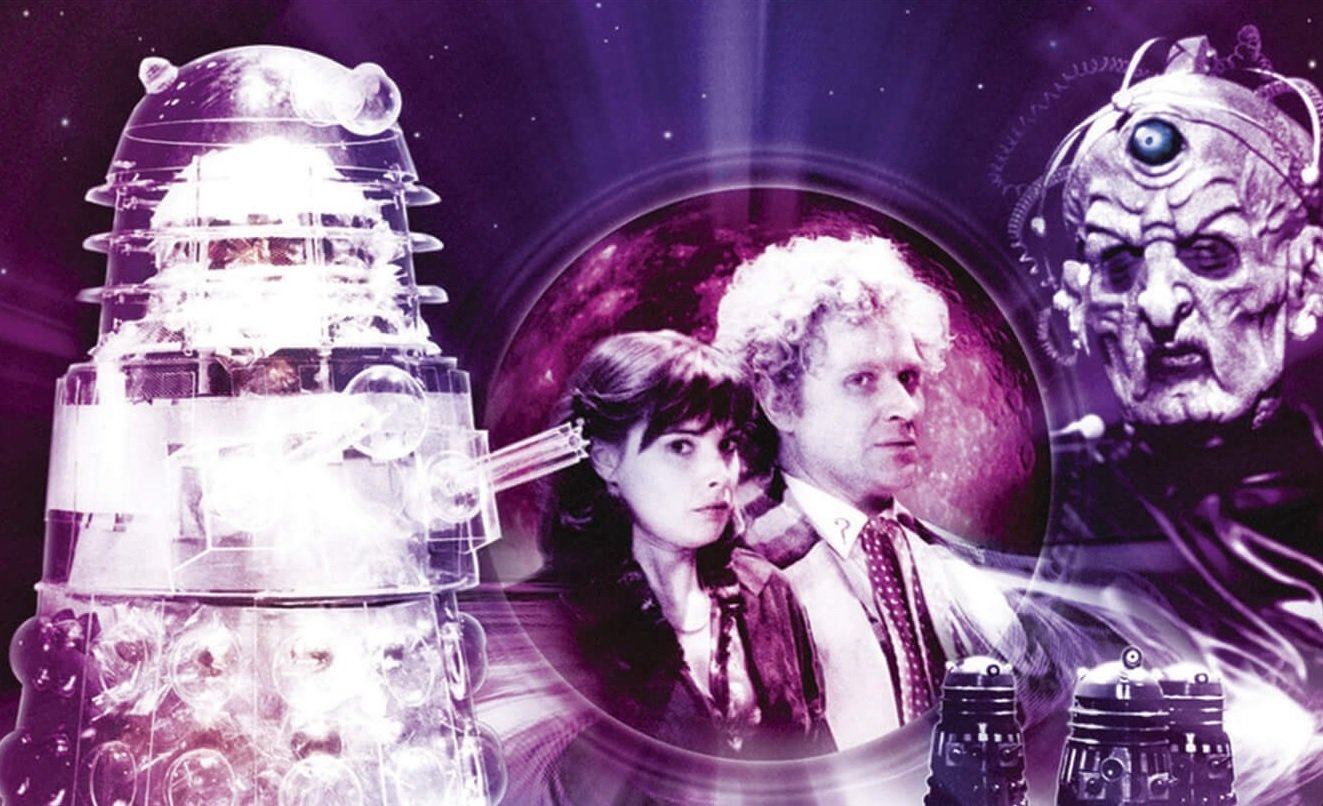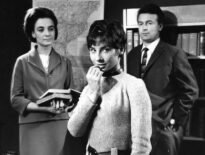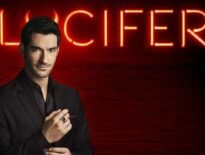Does something have to be ‘original’ to be good? I have a friend who – every time I pitch an idea to him – instantly tells me which film/ book/ TV series it reminds him of. “Oh, that sounds just like Blake’s 7!” he’ll say. “And?” says I. “So does Firefly. And Star Wars. And Star Trek, if you think about it.” The list goes on.
In recent times, I think a wave of paranoia has been sweeping across the creative world. I believe that some writers (particularly those who are tasked with contributing to an ongoing, major franchise) develop a complex – convincing themselves that, if you don’t subvert expectations, reinvent the wheel, and ‘think outside’ the proverbial box, they’ve failed in some way. I can just imagine them, slumped over their keyboards at three in morning, hissing through gritted teeth, coffee cup in hand: “It must be new! It must be different! I MUST MAKE MY MARK!”
This isn’t necessarily a bad thing. If a TV show constantly repeats itself, it can get old very quickly. It’s boring. It’s predictable. Audiences need surprising, and it’s the writer’s job to deliver. And increasingly, audiences are particularly savvy, and hard to catch off guard – especially when a plethora of spoilers is being leaked onto the webosphere with monotonous frequency.
So I can understand when a writer applies themselves to the task of trying really, really hard to be ‘original.’ And The Timeless Children was original. Love it or hate it, it subverted expectations – mainly because it rewrote a sizeable chunk of Who history.
The consequence, however, was that it upset a large portion of the fanbase. As in, really really upset them. And not just the Doctor Who fans who always vow to cancel their TV licenses if the TARDIS is repainted a darker shade of blue. I’m talking about real people. And I believe some of them when they say they won’t be watching the programme again.
Of course, every long-running franchise faces this issue. How do you give the fans more of what they want without repeating yourself? The answer, apparently, is to do the unexpected. Surprise them! Don’t turn left. TURN RIGHT. Make the Brigadier a Cyberman. Canonise the Morbius “Doctors.” It doesn’t matter if people are upset. Originality is king. Expectations are subverted.
But how far is too far? Because Caffѐ Nero, for example, could “subvert my expectations” by serving melted cheese instead of coffee. But they would probably lose my custom.
The answer, I believe, is to find a comfortable middle ground between sticking-to-what-works, and introducing something new. Indeed, Doctor Who has (historically) been very good at this. Yes, in some ways it is one of the most original shows ever made. And at the same time, it’s one of the least original shows ever made, too.

The writer Robert Holmes exemplifies this. In fact, some of his most beloved stories drew heavily (and I mean heavily) from pre-existing source material. The Talons of Weng-Chiang, for example, is about as close to a Sherlock Holmes parody as it is possible to come without actually using the name Sherlock Holmes. And the serial makes no secret of its unoriginality, even going to far as to dress the Doctor in the iconic deerstalker hat, synonymous with Baker Street’s most famous detective.
And nobody ever criticised The Talons of Weng-Chiang for its lack of originality. On the contrary, the story is often lauded as one of the greatest ever made, and it’s certainly one of the highlights of Robert Holmes’ writing career on Doctor Who. You could even argue that it’s successful because of its lack of originality, and the fact that it draws on such familiar and beloved tropes.
Then we have serials such as Revelation of the Daleks, written by Eric Saward. Again, this has gone down in Doctor Who history as ‘one of the classics,’ and is arguably second only in popularity to Vengeance on Varos, in terms of the Sixth Doctor’s era.
But Revelation of the Daleks was actually based on the 1948 novel The Loved One by Evelyn Waugh, and Eric Saward borrowed liberally from this text when creating character names, and even when crafting the basic premise. For example, both stories centre around a woman who’s struggling with complicated romantic feelings towards a fellow mortician. In Revelation, the principal characters are Tasambeker and Jobel; in The Loved One they’re Thanatogenos and Joyboy!
In short, Robert Holmes and Eric Saward are two of Doctor Who’s least original writers – and yet they’re also two of the most successful. (Holmes reportedly used to say, “Original ideas are great, but they don’t have to be your original ideas!”) Both writers drew from powerful, enjoyable source material, and they understood why it was enjoyable. They took the most effective elements from pre-existing stories and blended them into something new. This isn’t plagiarism – it’s inspiration. It takes real craftmanship to recognise when a concept works, and when it can be “borrowed from.”
And Holmes and Saward are by no means the first writers to be inspired by previous works. Heck, George Lucas’ Star Wars draws heavily (and unashamedly) from classical literature, and fairy tales. For this reason (especially with stories like Talons and Revelation), I don’t think it’s necessary to subvert expectations. Find out what works, and what people love, and give it to them in spades. I think these stories (and indeed many of Robert Holmes’ scripts) are all the better because of their unoriginality, not in spite of it.
But then we come to a more complicated problem: established canon. With a long-running franchise like Doctor Who, it’s constantly having to draw inspiration from its own source material.
For fans – generally speaking – this is no biggie. For instance, you won’t find many Whovians bemoaning the fact that the Doctor’s identity is still a mystery, or that the early days of Gallifreyan society are shrouded in mystery. Yes, these questions have been asked countless times, across many decades, and, for many people, the obscurity is part of the appeal. There is little appetite for these questions to be answered, or replaced. The repetition (or unoriginality, if you will) is part of the joy of being a Doctor Who fan.

But for the writer who believes that originality is the only path to success, this creates something of a headache. The fans want more of the same great product that they’ve always enjoyed. But the writer wants to do something fresh – perhaps to show that they’ve really, really flexed their creative muscles.
It could be a capitalist thing; the idea that something ‘should’ be constantly ‘improved’ to show that it’s capable of ‘growth.’ This concept is proved flawed time and time again, however – I refer you to Windows 8/ the side-scrolling Instagram feed/ New Coke. They were all disastrous endeavours. Because in reality, people are seldom clamouring for change. The wheel works. Un-originality reigns supreme. It may not be creatively satisfying to admit that people just want the same product ad infinitum, but more often than not, they do.
I ask you: would you have enjoyed Revelation of the Daleks more if Eric Saward had ‘subverted your expectations’ by telling you that the Daleks never existed? Or that the Doctor’s previous encounters with them never happened? Or that the Daleks weren’t designed by Davros, and didn’t come from Skaro? I mean, some people might – but let’s face it, Revelation of the Daleks is hardly crying out for franchise-bending plot twists. Yes it’s an unoriginal story, but it’s told superbly.
And when you think about it, the ‘plot twist’ as a convention is, arguably, a lazy one. Any typist worth their salt can invent random game-changers and toss them into a story. It’s the authorial equivalent of throwing a match into a petrol barrel. On this basis, any wordsmith could pen an expectations-subverting Doctor Who story by just-doing-whatever-they-want, and, when it proves unpopular, claim that the voices of dissent are simply the keyboard warriors of the Old Guard who think that the show peaked with the unaired pilot.
On the other hand, I would argue that it takes more skill (and wider reading) to be unoriginal, a la Robert Holmes and Eric Saward. Saward in particular took inspiration from a novel that worked, seeing how its most effective elements could be repurposed into a Doctor Who story.
And let’s not forget, this was a technique that Steven Moffat deployed as well, using pre-existing source material for no fewer than four Doctor Who Christmas specials: A Christmas Carol (based on the Dickens novel); The Doctor, the Widow and the Wardrobe (based on The Lion, the Witch and the Wardrobe); The Snowmen (The Snowman); and Last Christmas, borrowing heavily from The Thing, Alien, and Inception. Quite an achievement!
So does Doctor Who have to subvert expectations to tell effective stories? In my opinion, no. Like Caffѐ Nero, it should very much meet expectations, i.e. sell the coffee that I came in for. But if it occasionally refreshes its pastries, changes its décor, and takes inspiration from other successful coffee houses, I wouldn’t have any objection. In fact, I’d be delighted.
Just don’t burn your menu and start selling pizza.



